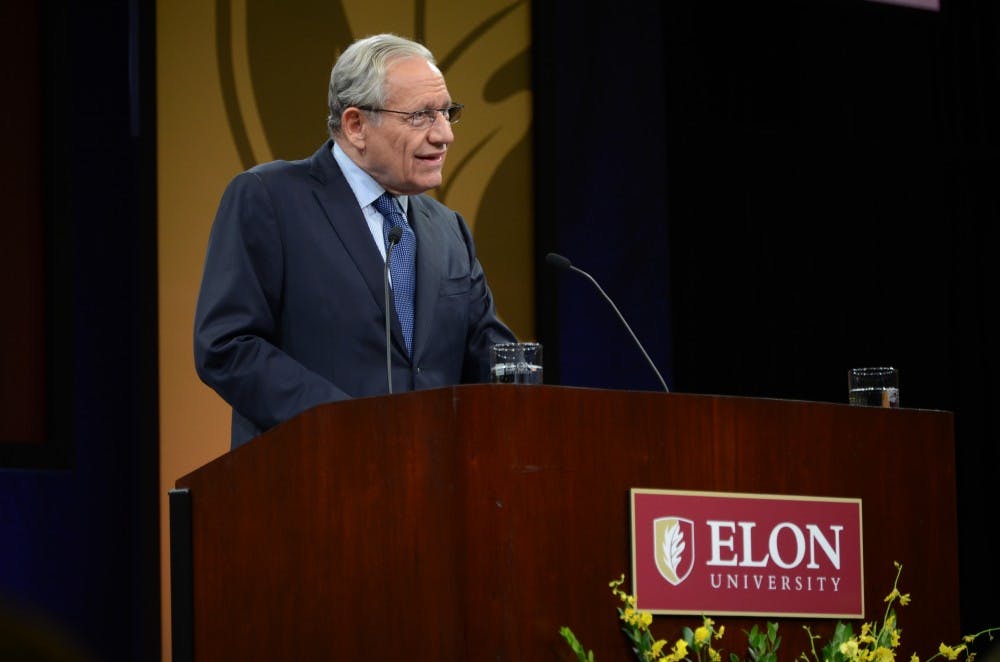Editor's note: This Q&A has been updated to accurately reflect Woodward's use of the words "diluted" and "deluded."
On Sept. 29, Elon News Network sat down briefly with Bob Woodward before he gave his Convocation Address at Elon University. Here is a transcript of that interview:
ENN: How has American politics changed since you’ve been reporting?
Woodward: Of course, the lens through which we see American politics has changed radically since [President] Nixon. We could work on a Watergate/Nixon story for three weeks and people would be patient — we would do drafts. Now, in the internet age, there’s no patience. Everything has to be done instantly, so we spend less time as journalist on the stories. If you get what looks like an advance on a story, somebody will say, 'Well, can we get it on the website by noon?'
And [there's] less interviews, less shoe leather, less really looking through documents and figuring things out. So we get diluted information and deluded information often.
ENN: There has been a strong negative portrayal of the media during this campaign cycle. If someone was telling you about that, what would you tell them?
Woodward: Well, I think we have to prove ourselves. They are the customers, people who consume the media. If we don’t have satisfied customers, you can’t blame the customers. You’ve got to blame yourself.
We need to work harder, present more authoritative information. I think balance is important — I think even people who feel very strongly about one candidate or another will appreciate balance. Somebody who comes in and says, 'There’s this and there’s that.' I’ve done this for four and a half decades, and you realize everyone is a mixed bag. They have positive attributes, negative attributes, and the job of the press and reporters is to illuminate all of that as comprehensively as possible. I always say it’s an excavation — you’re like an archaeologist.
ENN: When you get responses from people — like with your book on John Belushi, Wired — there is some negative feedback that you got from the book. How do you handle that?
Woodward: When somebody criticizes you, first, you have to say, 'Maybe they’re sincere or maybe there’s grounds for doing that.' The Belushi book is about the great actor. He died from a drug overdose — he was not run over by a car. In the book, where all the interviews were done on the record and I had documents, it shows that people around him — his friends, his associates, his directors, his managers — we [would] now call them drug enablers. They were people who make it possible for him to buy and use drugs. Not only did they make it possible, they encouraged it. The criticism of me is they didn't like the ending — that he died of a drug overdose. I cant change that ending.
What’s interesting is some of the people feel there isn't enough of Belushi as a comedian [and] as a human being. Actually, there's a great deal of that in the book, but the ugly scenes of him — particularly dying of drugs at the end — so sears itself in your memory that you recall and think the book is about it. It actually is a straight-forward account, but its just like any of these books when you actually dig beneath the surface [and] present what you found, a lot of people aren’t going to like it.
ENN: You’ve reported on eight presidents in office and been alive for much more. As you’ve gone on and been inside reporting, what do you think is the more important quality for a president to have?
Woodward: To listen and grow and not be rigid. Presidents get tested in ways that, when they take that oath on January 20th, presidents don't get a sheet saying, 'This is what you're going to have to deal with.' What surprise is always around the corner.Nobody found that more clearly than George W. Bush. I was working on a book about his tax cut when 9/11 happened. I realized that that is going to define his presidency. It actually defined through the war — Afghanistan, Iraq and the war on terror — and whats happened in the past 15 years in this country.


